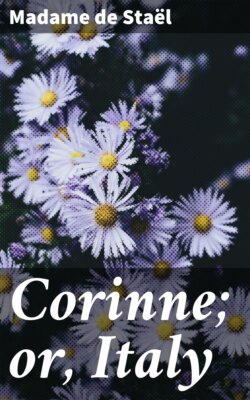Читать книгу Corinne; or, Italy - Madame de Staël - Страница 12
На сайте Литреса книга снята с продажи.
CHAPTER V.
ОглавлениеOswald sped to Rome, over the marches of Ancona, and the Papal State, without remarking or interesting himself in anything. Besides its melancholy, his disposition had a natural indolence, from which it could only be roused by some strong passion. His taste was not yet developed; he had lived but in England and France;[1] in the latter, society is everything; in the former, political interests nearly absorb all others. His mind, concentrated in his griefs, could not yet solace itself in the wonders of nature, or the works of art.
D'Erfeuil, running through every town, with the Guide-Book in his hand, had the double pleasure of making away with his time, and of assuring himself that there was nothing to see worthy the praise of any one who had been in France. This nil admirari of his discouraged Oswald, who was also somewhat prepossessed against Italy and Italians. He could not yet penetrate the mystery of the people or their country—a mystery that must be solved rather by imagination than by that spirit of judgment which an English education particularly matures.
The Italians are more remarkable for what they have been, and might be, than for what they are. The wastes that surround Rome, as if the earth, fatigued by glory, disdained to become productive, are but uncultivated and neglected lands to the utilitarian. Oswald, accustomed from his childhood to a love of order and public prosperity, received, at first, an unfavorable impression in crossing such abandoned plains as approaches to the former queen of cities. Looking on it with the eye of an enlightened patriot, he censured the idle inhabitants and their rulers.
The Count d'Erfeuil regarded it as a man of the world; and thus the one from reason, and the other from levity, remained dead to the effect which the Campagna produces on a mind filled by a regretful memory of those natural beauties and splendid misfortunes, which invest this country with an indescribable charm. The Count uttered the most comic lamentations over the environs of Rome. "What!" said he, "no villas? no equipages? nothing to announce the neighborhood of a great city? Good God, how dull!" The same pride with which the natives of the coast had pointed out the sea, and the Neapolitans showed their Vesuvius, now transported the postilions, who exclaimed, "Look! that is the cupola of St. Peter's."—"One might take it for the dome of the Invalides!" cried d'Erfeuil. This comparison, rather national than just, destroyed the sensation which Oswald might have received, in first beholding that magnificent wonder of man's creation.
They entered Rome, neither on a fair day, nor a lovely night, but on a dark and misty evening, which dimmed and confused every object before them. They crossed the Tiber without observing it; passed through the Porto del Popolo, which led them at once to the Corso, the largest street of modern Rome, but that which possesses the least originality of feature, as being the one which most resembles those of other European towns.
The streets were crowded; puppet-shows and mountebanks formed groups round the base of Antoninus's pillar. Oswald's attention was caught by these objects, and the name of Rome forgotten. He felt that deep isolation which presses on the heart, when we enter a foreign scene, and look on a multitude to whom our existence is unknown, and who have not one interest in common with us. These reflections, so saddening to all men, are doubly so to the English, who are accustomed to live among themselves, and find it difficult to blend with the manners of other lands. In Rome, that vast caravansary, all is foreign, even the Romans, who seem to live there, not like its possessors, but like pilgrims who repose among its ruins.[2] Oppressed by laboring thoughts, Oswald shut himself in his room, instead of exploring the city; little dreaming that the country he had entered beneath such a sense of dejection would soon become the mine of so many new ideas and enjoyments.
[1] This alludes to a previous tour; in his present one, Oswald has not approached France. His longest stay was in Germany.—TR.
[2] This observation is made in a letter on Rome, by M. Humboldt, brother to the celebrated traveller, and Prussian minister at Rome; a gentleman whose writings and conversation alike do honor to his learning and originality.
